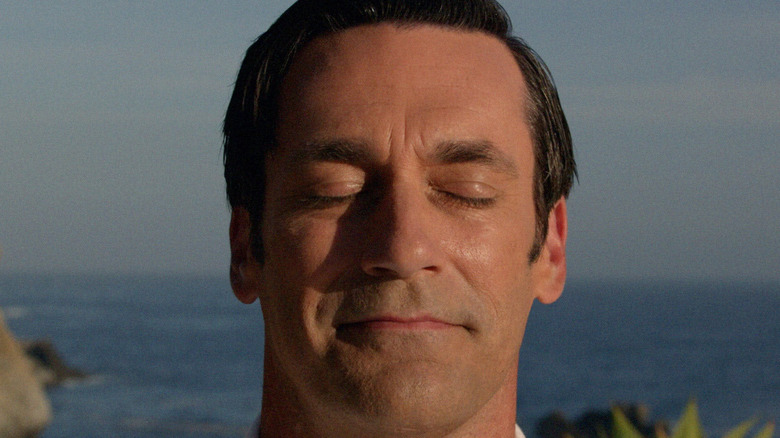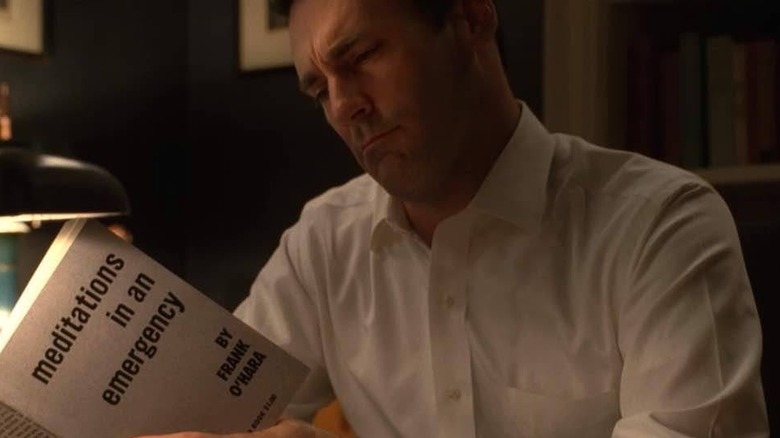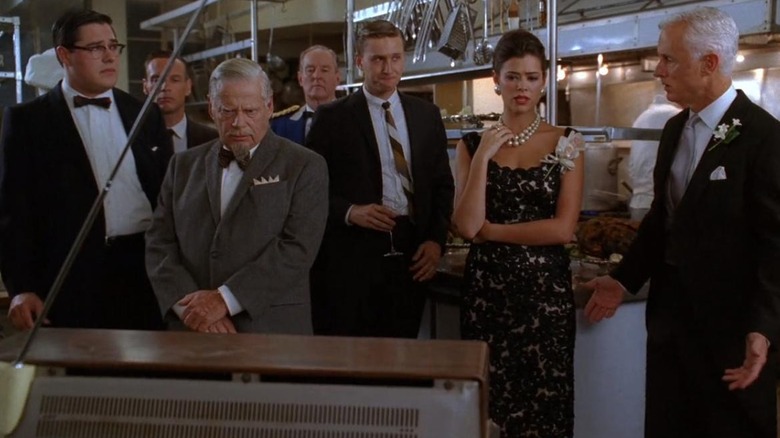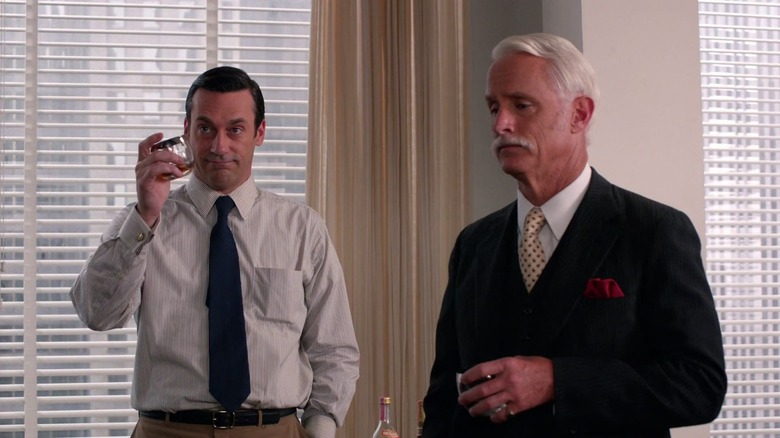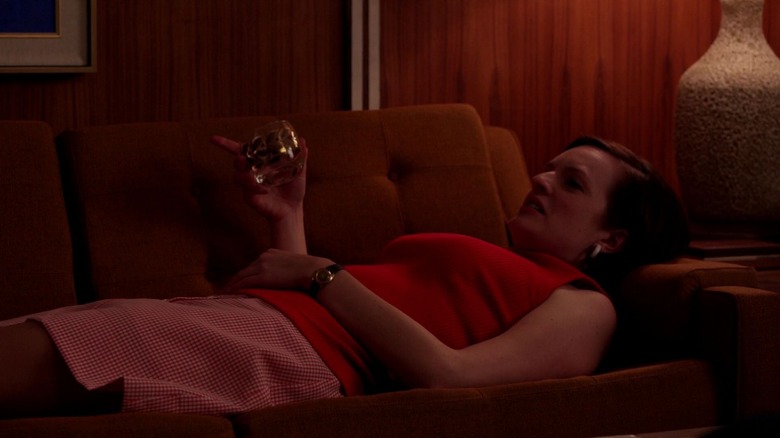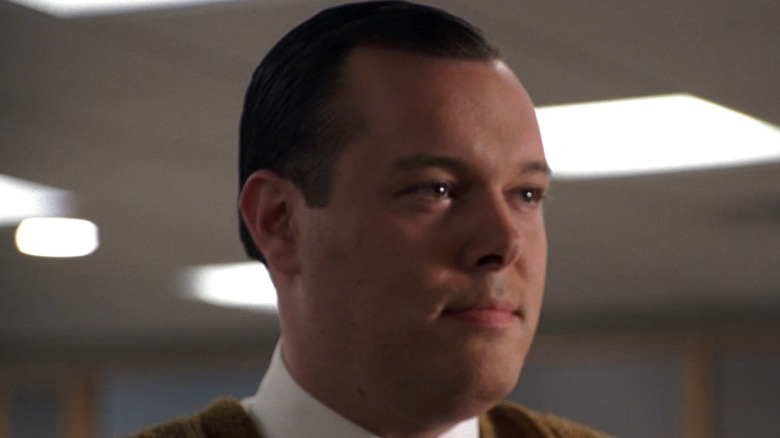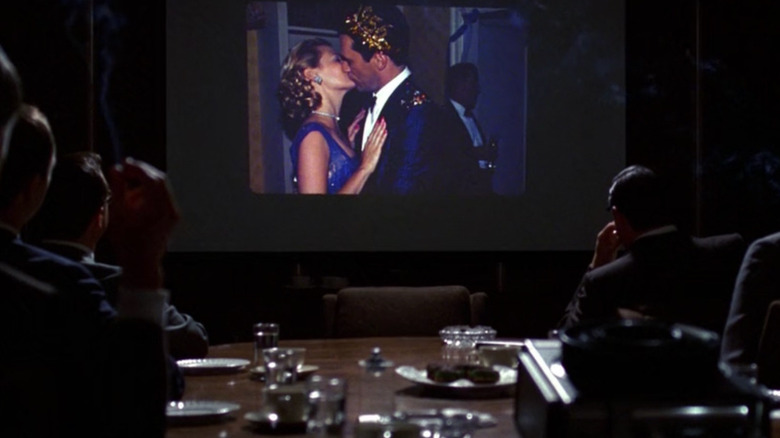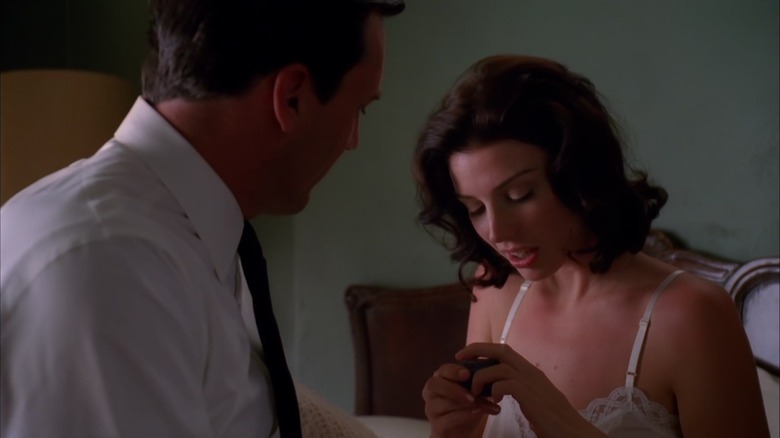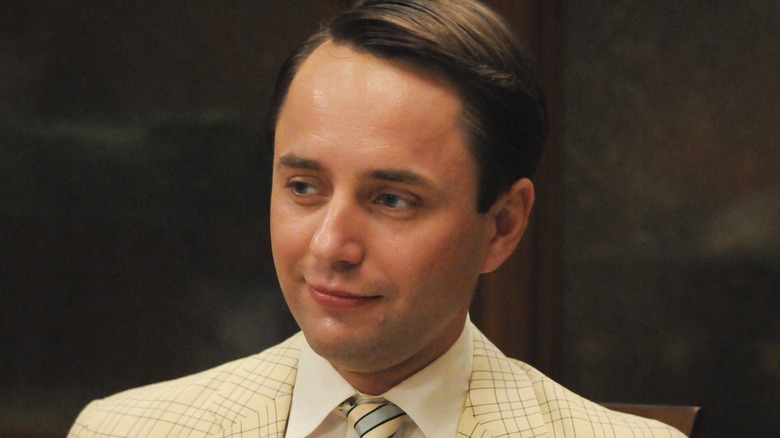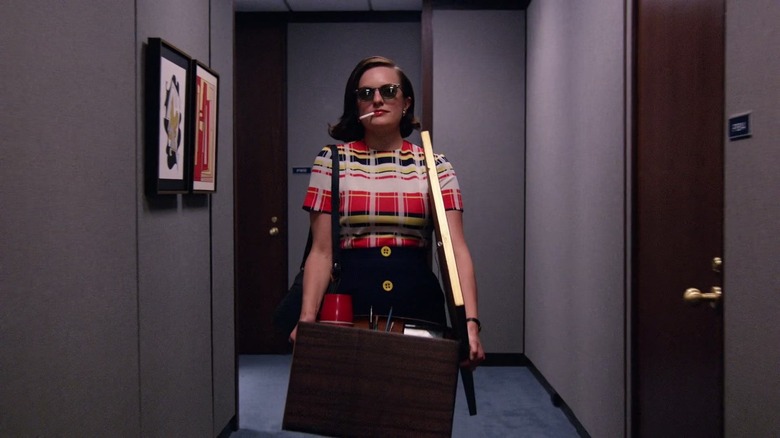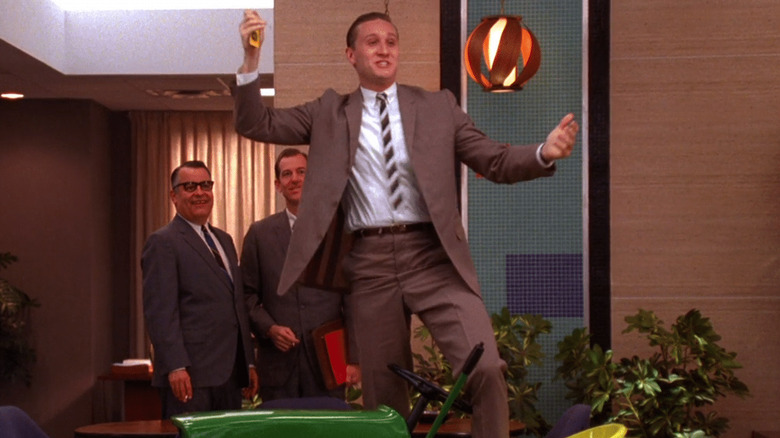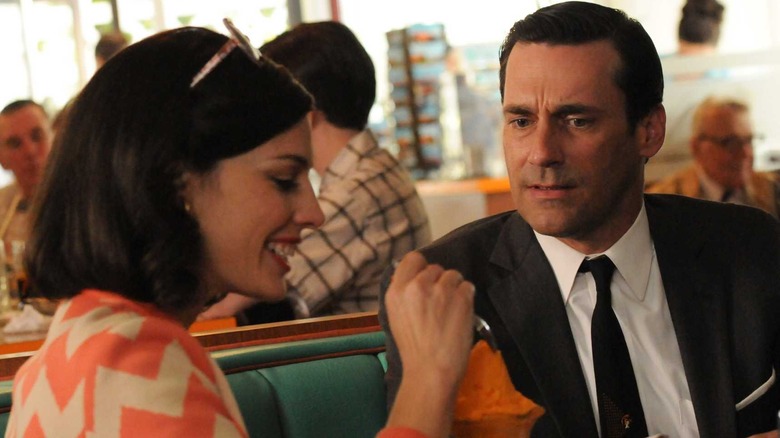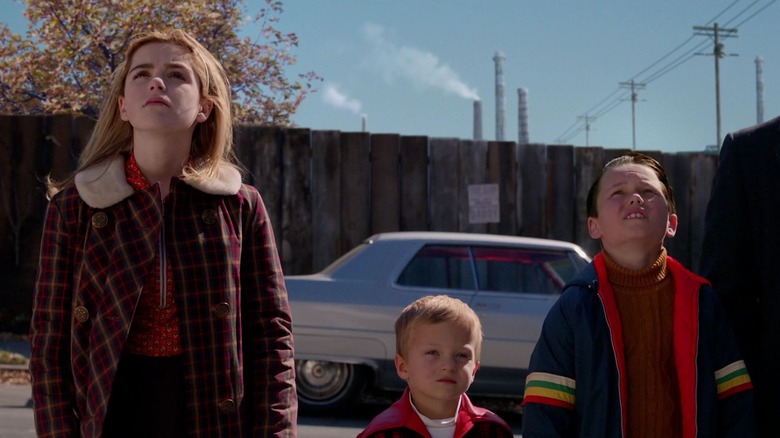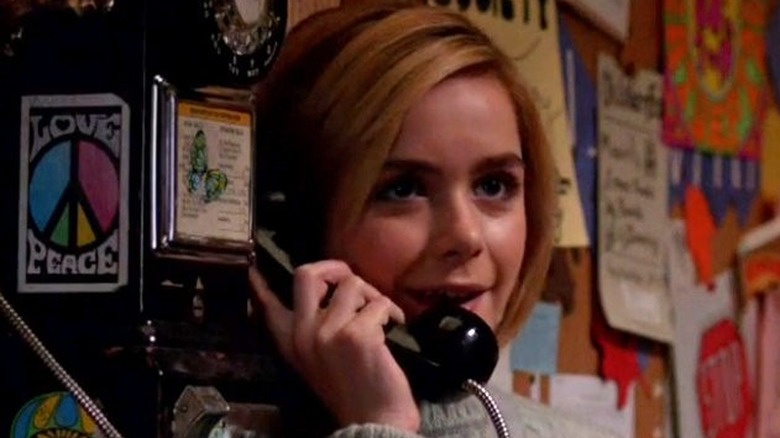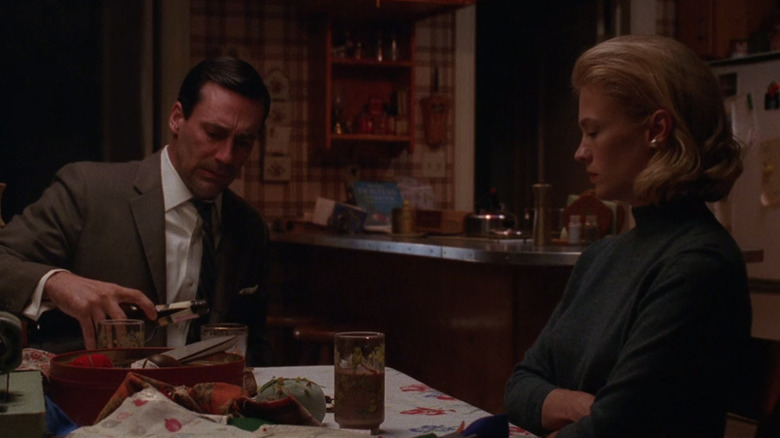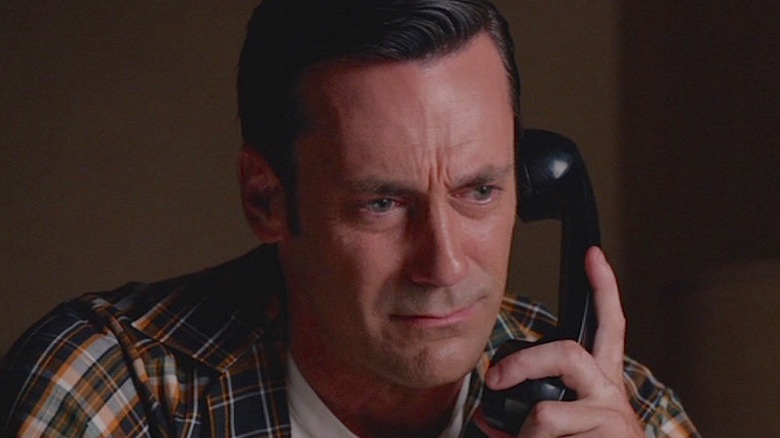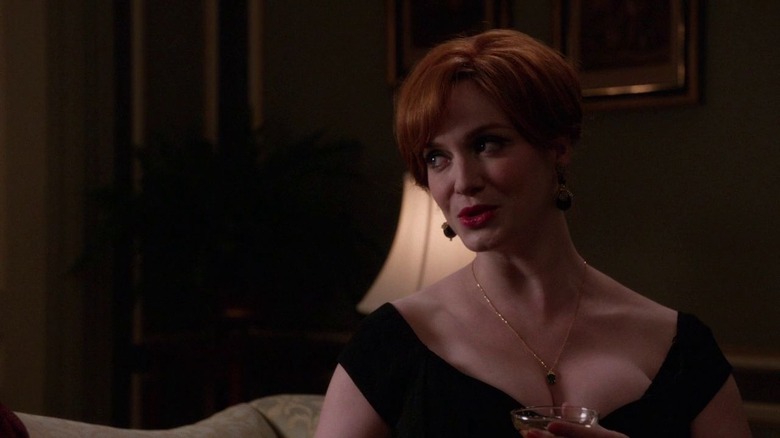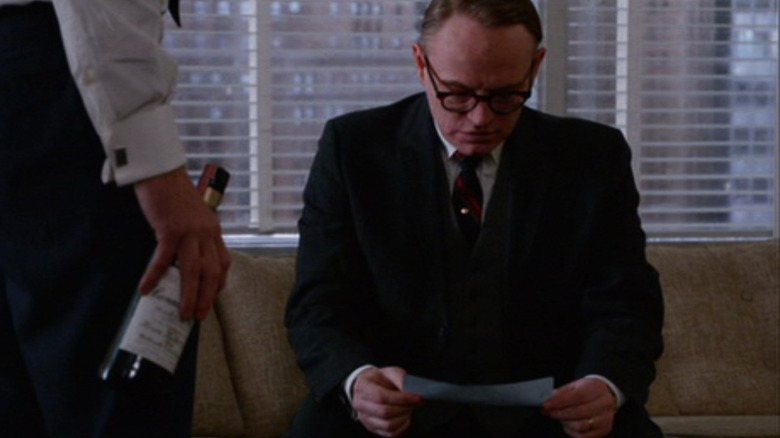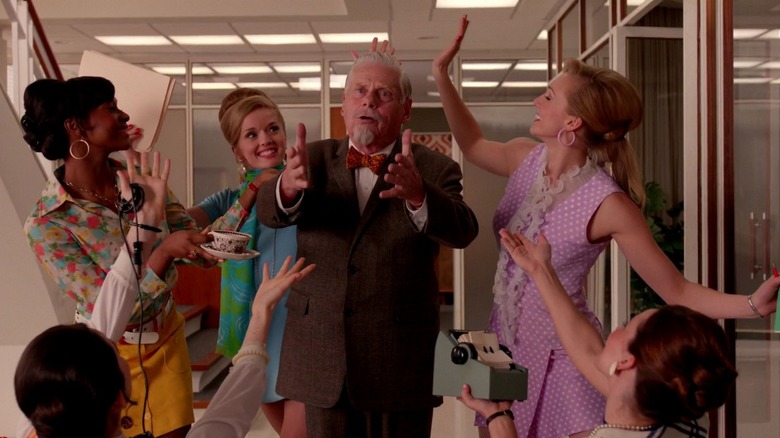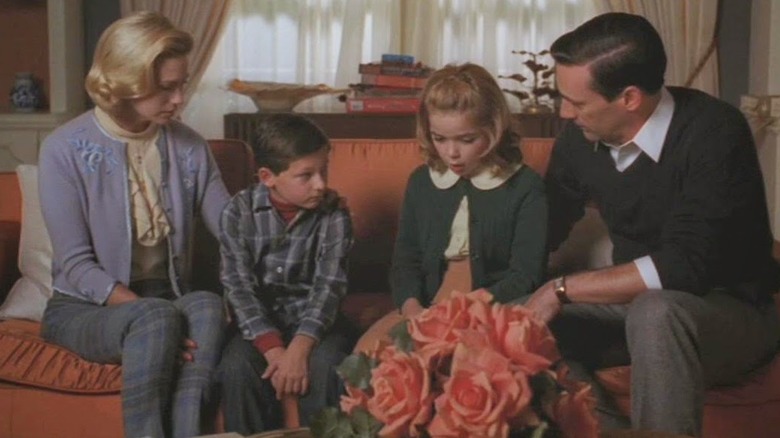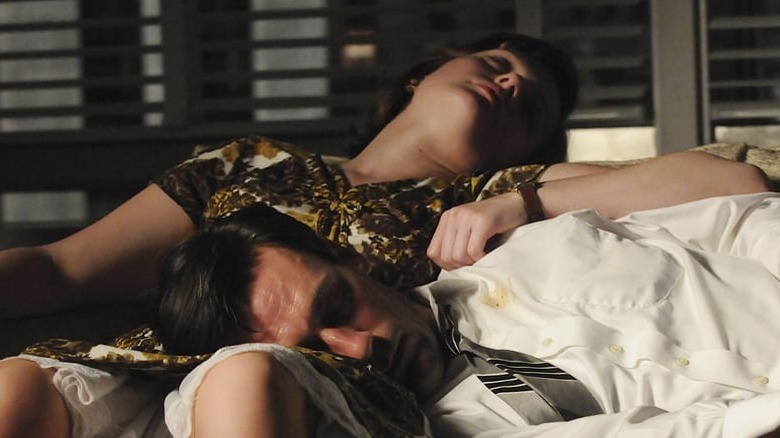The 20 Best Mad Men Episodes Ranked
Set against the backdrop of a 1960s America in which real, historical events are thematically relevant to our characters' arcs, Matthew Weiner's period drama "Mad Men" centers around a New York City advertising agency. More significantly, by following the lives of these (sometimes truly despicable) advertising executives, the show successfully interrogates the decade's social issues while simultaneously tracing rising feminism and shifting cultural ideals.
What propels "Mad Men" from good to award-winning is its impeccable use of dramatic irony — basically, the audience is always more aware than the characters — to present a rich portrait of the times, in which the old ways of '50s era Americana are starting to become archaic in an ever-evolving world. It pits a more progressive (but uncertain) future against outdated (and often bigoted) traditions of the past, and here we find the show's powerful narrative spine. We see the characters' hypocrisy reflected as they struggle with the images they present to the world and their own personal truths. Everything from authority to the illusion of identity is a performance, and our lead protagonist — the charming Donald Draper, who's hiding a dark past — is the series' biggest pretender.
And so, in celebration of this AMC drama's legacy, we've compiled a list of the show's 20 best episodes, ranked from good to great.
20. Meditations in an Emergency (Season 2, Episode 13)
The finale of the show's sophomore season, "Meditations in an Emergency," follows Don Draper (Jon Hamm) as he returns from his California trip amidst the Cuban Missile Crisis, and his wife Betty Draper (January Jones) as she deals with a much more personal struggle to come to terms with an unwanted and unplanned third pregnancy in an era that gives her few options. While Betty dreads telling her husband the news, Peggy Olson finally reveals to past lover Pete Campbell (Vincent Kartheiser) that he fathered the child she gave up.
Noal Murray of The A.V. Club gives this episode a solid A rating, "marvel[ing] at how the careful development of 'Mad Men”s characters brought us to a finale which I think rewarded the investment we've made in these characters ... while also leaving us a lot to ponder." In addition to examining the issues women face regarding reproductive health and bodily autonomy, this episode's narrative tackles the show's integral theme of identity.
19. The Grown-Ups (Season 3, Episode 12)
The narrative of "The Grown-Ups" traces the aftermath of a devastating national tragedy. Upon learning of President John F. Kennedy's assassination, our characters react in various ways. Roger's (John Slattery) daughter Margaret (Elizabeth Rice) is distraught over what the news means for her impending wedding. Kennedy's death throws Betty, who's still reeling from all she's learned about her husband's past, into fits of tears. Don, on the other hand, appears completely unaffected — emotionless, even. Compared to the reactions of others (their grief, sorrow, pain, and fear), Don comes across as eerily detached, which doesn't go unnoticed. On top of that, many of our characters — including the wedding guests who do still show up for the nuptials — glue themselves to the television screens, fixated on the news, essentially acting out the equivalent of modern-day doom-scrolling.
But what's most impressive here, and what really makes this one of the show's best episodes, is that we find ourselves truly sympathizing with Pete Campbell, who we so often love to hate. And, for the earlier entries of "Mad Men," that's quite the narrative accomplishment.
18. Time & Life (Season 7, Episode 11)
"Time & Life" signals the impending end of an era — both for the employees of our favorite, drama-laden advertising agency and for us as viewers. The '60s are officially over. It's the summer of 1970 now, and McCann has plans to absorb Sterling Cooper & Pryce. Upon learning about these plans, Don tries to — at long last — relocate to L.A., hoping to manage contracts that fly in the face of McCann's portfolio from a new home on the West Coast. While Don attempts to make real changes in his life, Pete and Trudy bond, engaging in a genuinely productive conversation about their past faults and regrets during a preschool mishap.
As the cold, corporate world begins to tear down the careers (and yes, legacies) our characters have built over the years, we can sense — in a very palpable, sad, and bittersweet way — that the end is near. What's more, in this episode (and this last season in general), we see Jon Hamm at his very best in his role as the ever-conflicted Donald Draper/Dick Whitman.
17. The Strategy (Season 7, Episode 6)
In the summer of 1969, as the decade comes to a close, the advertising agency is faced with losing its coveted Chevy account, and the enigmatic Bob Benson (James Wolk) is offered an enticing opportunity with Buick. Envisioning an effective way to be seen as a "good family man," while also providing Joan and her son with security and stability, Bob uses this potential new job as an excuse to propose marriage. And, as Pete fights with Trudy over trying — and failing — to visit his daughter, Peggy prepares for a Burger Chef pitch by visiting several of the company's locations. Even after impressing her colleagues with her work, though, Pete would rather have Don close the deal.
It may not be as hard-hitting or emotionally compelling as other entries on this list, but by emphasizing the tension dwelling within our characters — and by bringing that disconnect between their core truths and their public images to the forefront of the narrative — "The Strategy" engages, quite effectively, with its overarching theme of identity.
16. Nixon vs. Kennedy (Season 1, Episode 12)
Emily St. James of The A.V. Club gives "Nixon vs. Kennedy" an A rating, calling it "one of the first season's finest hours." Set against the backdrop of the 1960 U.S. presidential election, Season 1's penultimate episode traces the peaking animosity between the guarded Don Draper and the petulant Pete Campbell. Sterling Cooper's employees celebrate election night with an after-hours party, cheering on Nixon by drinking water coolers filled with Creme de Menthe, acting out a stage play written by their very own Paul Kinsley, and engaging in one-night stands with their co-workers. Meanwhile, Pete sits at home with a drink, investigating the package he stole from Don's office and contemplating blackmail to secure a much-desired promotion. Don spirals when Pete confronts him with his past, but not in the way the younger man expects.
This character-driven narrative marks the abrupt end of Don's affair with businesswoman Rachel Menken (Maggie Siff) and fuels the fire for future feuds between Pete and Don. But what's more significant here is that we glimpse the real man hidden behind the carefully crafted mask of Creative Director Donald Draper: Dick Whitman. And, in seeing more of his origins, we begin to understand why he's so intent on holding onto the life he's built, and so apprehensive of what the future might bring.
15. The Wheel (Season 1, Episode 13)
Matt Zoller Seitz of Vulture believes the last two episodes of the first season fit together perfectly, claiming they "flow into each other, speak to each other, mirror each other. They are fully loaded, very different and yet complementary picture wheels." But where the penultimate episode depicts the power struggle between Don and Pete, "The Wheel" sees our characters, in the aftermath of election night and various poor decisions, coping with disappointment, disillusionment, guilt, fear, and nostalgia.
After Francine's confession regarding her own husband's infidelity, Betty ponders Don's faithfulness, and even considers peeking at the phone bill for answers. While she doesn't uncover an affair, she does discover a different — and still devastating — truth. A guilt-ridden Don discovers a devastating truth, too, when he tries to reach out to his younger brother Adam. Meanwhile, Pete uses familial ties to land a big account, and a newly-promoted Peggy (Elisabeth Moss), still unaware of her pregnancy, gets the biggest shock of her life.
The episode's most notable moment comes at the end, as Don pitches "the wheel" (a new slide projector) by presenting a slideshow of the life he's shared with Betty. In all these photos, he and Betty appear genuinely happy, but juxtaposed against the pair's tense, secret-filled marriage, the images are jarring, highlighting the tension between fantasy and reality, and foreshadowing the inevitable end of a relationship.
14. Tomorrowland (Season 4, Episode 13)
Set in the fall of 1965, the Season 4 finale, "Tomorrowland," sees Don traveling to California with his son Bobby, his daughter Sally (Kiernan Shipka), and his secretary-turned-lover, Megan Calvet (Jessica Paré), who he's hired as the kids' babysitter following Betty abruptly and unexpectedly firing their long-time nanny Carla. During his half-vacation/half-business trip, he makes a life-changing decision regarding his current romantic relationships. With Don on the other side of the country, Peggy works with Ken Cosgrove to bring in the first account the agency has had in several weeks.
"Tomorrowland" features dramatic irony at its finest as we watch our lead protagonist struggle between his true, vulnerable self, and his confident, dapper persona, eventually failing to change and falling into old habits. It's easy to see how this storyline, so intrinsically focused on Don/Dick's poignant, lifelong crisis of identity, is considered one of the show's best.
13. Signal 30 (Season 5, Episode 5)
"Signal 30" was well-received by critics, with Emily St. James of The A.V. Club calling this mid-season 5 installment "transfixing and incredible ... a beautiful hour of television, full of powerful moments."
The episode opens with Pete sitting through a mandatory driver's education course and trying to get cozy with one of the college-bound attendees. Right away, we know this is going to be a Campbell-centric narrative, and right away, we're invested. From there, we see him in the throes of bitter jealousy, making a fool of himself. During the dinner party he and his wife Trudy (Alison Brie) are hosting, he discovers that his colleague and frequent rival, Ken Cosgrove, moonlights (quite successfully) as a science fiction writer. This exacerbates the tension between the person Pete is and the person he tries to be, ultimately culminating in quite the identity crisis.
According to Paste Magazine's Bonnie Stiernberg, while he's "easy to dismiss, [Pete is] one of the most complex, underrated characters on TV." As much as we may not really like Pete (he can be a despicable person, after all), he still manages to mesmerize us with a surprising amount of depth. As a result, we do, on occasion, find ourselves empathetic toward him.
12. Lost Horizon (Season 7, Episode 12)
Late in the show's final season, "Lost Horizon" serves as a transitional episode for our characters. Not only are they moving from Sterling Cooper & Pryce to their parent company's headquarters, but they're also finally figuring out — after years of inner tension and conflict — what they really want.
Frustrated by the overwhelming incompetence and rampant sexism in her new work environment at the McCann headquarters, Joan calls on Jim Hobart to step up, but all he wants is to buy out her shares. As Joan reconsiders her life's trajectory, Peggy, the only copywriter currently without an office at McCann, refuses to relocate until a space is found for her. In the meantime, she clings to the emptied offices of Sterling Cooper & Pryce and bonds with Roger, who's also reluctant to leave the world he knew behind. And, during a meeting, Don decides to quietly slip away and start driving west.
"Lost Horizon" also features one of the show's most iconic images. With a cigarette dangling from her lips, a thick pair of sunglasses disguising her hangover, and an erotic painting gifted to her by Roger tucked underneath her arm, Peggy waltzes through the halls of her new office, ready to claim her new space.
11. Guy Walks Into an Advertising Agency (Season 3, Episode 6)
Time's James Poniewozik declares this Season 3 entry a "sufficiently stunningly bloody episode to make up for several episodes of smoke exhalations and brooding looks." And, readers, he's not wrong. While it may not be "Sopranos"-level bloody, for a workplace period drama set in a tidy corporate New York advertising agency, it's practically a bloodbath.
Here, around Independence Day weekend in the summer of 1963, Ken Cosgrove (Aaron Staton) brings his riding lawn mower (let's call it Chekhov's Landscaping) into the office as the Sterling Cooper employees prepare for a visit from their British owners, who are in town to reassign and replace Lane Pryce (Jared Harris). Unfortunately, the potential new guy's arrival coincides with the office's farewell party for Joan, who, banking on her husband getting accepted into a medical residency program in the city, has formally resigned. At the party, things get ... well, unexpectedly gruesome.
10. Far Away Places (Season 5, Episode 6)
The Season 5 episode "Far Away Places" weaves together three short narratives: one Peggy-centric, one Roger-centric, and one Don-centric (plus a little epilogue at the end). As Don and Megan embark on a weekend away, Peggy reacts to flopping with Heinz by engaging in some questionable sexual decisions with a stranger in a movie theater, and Roger has a revelation about his marriage to Jane (Peyton List) after the pair take LSD during a social gathering. During Don's brief reprieve from the city and all his work obligations, he discovers — to his utter horror — that Megan doesn't like orange sherbet. As a result, in just one meal, their romantic road trip dissolves into catastrophe.
Joel Bocko at Lost in the Movies believes the "anthologized form" of these intertwining stories "heightens their comparative qualities," describing the plotlines as "tales of the lonely self smashing against the walls of thwarted communion."
9. In Care Of (Season 6, Episode 13)
The Season 6 finale, "In Care Of," is the only episode from its season to earn a place in the show's top 20. The narrative follows an increasingly unhinged Donald Draper: After spending the night in jail because of his brawl with a preacher, Don sets his sights on moving to California for a much-needed fresh start. His potential role as a West Coast representative for the company is also a great opportunity for Megan's acting career. It is L.A., after all. A successful pitch to Hershey's Chocolate is Don's way into this dream life, but things don't go as planned. Meanwhile, Pete and Bob butt heads in the professional world: After Pete blames Bob for his mother's presumed death, Bob finds a way to sabotage Pete's relationship with Chevy, securing the account for himself.
This episode is significant in that our lead protagonist sheds some of that Donald Draper armor, revealing an awful, heartbreaking truth about his past as the son of a sex worker to his colleagues. The honesty even extends to his children here, as we see him, in a moment of true change, willing to be vulnerable while actively working to overcome his identity crisis.
8. The Milk and Honey Route (Season 7, Episode 13)
"The Milk and Honey Route," which happens to be the final season's penultimate episode, sees Don continuing his trek to a new life on the West Coast. During the journey, he has panicked dreams about the cops coming for him. Fortunately, that fear doesn't come to pass, and he even finds brief camaraderie with a group of Korean War veterans. Unfortunately, things go south pretty quickly when those same veterans accuse him of stealing money meant to help one vet repair his home. Back in New York City, a surprise visit from Duck Phillips signals an unexpected — but welcome — new start for Pete and Trudy, while Betty, diagnosed with lung cancer and finding herself more alienated than ever, makes a devastating decision about her treatment.
All in all, this expertly-crafted narrative offers a complex exploration of the show's core themes of escapism, identity, and alienation, and points to a satisfying (though not necessarily happy) conclusion for many of the characters we've followed for seven years as they find courage to follow their hearts.
7. The Gypsy and the Hobo (Season 3, Episode 11)
With its narrative focus on three relationships (Betty and Don, Joan and Greg, and Roger and Jane), Slant's Emily VanDerWerff argues that, thematically, this Season 3 entry is all about intimacy and uncertainty brought by a union built on a foundation of lies. Joan continues to clash with her physically and sexually abusive husband and his poor life decisions (like joining the army after an unsuccessful foray into psychiatry), while Roger has a surprising realization about his new wife, Jane.
By this point, we've watched nearly three seasons of ratcheting marital tension between Don and Betty, exacerbated by Don's dishonesty and infidelity, and by Betty's depression and loneliness. Here, we see this unhappy housewife finally confronting her ever-absent husband about all of his lies, and Don finally revealing his well-guarded secrets to the woman with whom he's shared the past several years of his life. This long-awaited scene does not disappoint. Both January Jones and Jon Hamm mesmerize in their perspective roles — Jones as the stunned Betty and Hamm as the vulnerable Don — as the characters sit across from each other at the kitchen table and have a real, honest, and ridiculously overdue conversation.
6. Person to Person (Season 7, Episode 14)
The series finale of "Mad Men", "Person to Person," follows the California-bound Don Draper. While stopped in Utah, he learns of Betty's terminal cancer, and even though he begs her to let him relocate the children to California, she refuses, insisting they have "a woman in their lives." As the crushed Don finds himself at an oceanside retreat continuing his soul-searching, Ken Cosgrove approaches Joan with a business opportunity, Peggy and Stan confess their feelings, and Roger and Marie embark on a love-filled honeymoon.
In the end, we see Don bond with a stranger during a moving group therapy session, shedding his shiny armor as Donald Draper, and coming to terms with his past. As he meditates, dreaming up that famous 1971 Coca-Cola ad, we see very clearly that he's not quite Don Draper anymore. Nor is he the scared, abused Dick Whitman of his past. Maybe he'll go back to McCann, like Peggy begs him to do, and pitch the Coke ad. Maybe he won't. But that's not what matters here. What does matter is that, whatever he chooses to do, he'll be doing it as someone new and truer to himself.
5. The Other Woman (Season 5, Episode 11)
The A.V. Club's Emily St. James compares "The Other Woman" to one of the best "Sopranos" episodes: "Employee of the Month." But whereas "Employee of the Month" depicts the aftermath of a violent sexual assault and Dr. Melfi's moral battle as she debates asking Tony Soprano for an unethical favor, "The Other Woman" lays bare an unsavory truth about the male gaze and the constant objectification of women. It's everywhere — even in the workplace.
Here, Pete sees a chance to secure the sought-after Jaguar account when Herb Bennet, the head of the dealers' association, expresses interest in a night with Joan Harris (Christina Hendricks). When Pete first asks Joan to sleep with Herb, her initial reaction is one of appropriate shock and scorn, but that soon changes. What's particularly upsetting — and telling — about this storyline is that the men of the office, sans Don, don't see anything wrong with pimping out their female colleague for a business opportunity. Embezzler Lane even gives her advice on how to handle her incoming money.
"The Other Woman" is not shy with its cultural criticisms, and throughout the episode, we wonder if this is really who these male characters are. Ultimately, the unsettling narrative forces us to confront ugly realities about the world, namely the way some men objectify women for their own means, making it a tough but incredibly compelling watch.
4. Commissions and Fees (Season 5, Episode 12)
"Commissions and Fee" is another hard-hitting episode focused on two of the show's core themes: identity and alienation. By examining these themes in the face of change and loss, the narrative effectively explores some of our characters' gradual realizations that, despite being surrounded by family, friends, and colleagues, we're still — when all is said and done — utterly alone in the world.
As Sally reaches puberty and drives her parents a little crazy by refusing to go on a family ski trip with Betty, inviting herself to Don and Megan's apartment for the weekend, and hitting a museum with Glen Bishop, Don discovers Lane Pryce's embezzlement and promptly fires the man. Unable to cope with the loss of his job and the loss of the life he knows, Lane spirals.
As Uproxx's Alan Sepinwall notes, "There [is] a palpable, painful sense of dread throughout this episode." We know that, once we wade through the anxious tension, tragedy awaits us. In the end, what makes this installment one of the best "Mad Men" has to offer is its richly-layered depiction of what happens when you can no longer reconcile who you've become and who you want to be.
3. Waterloo (Season 7, Episode 7)
In "Waterloo," which takes place in the middle of the show's final season and is set against the backdrop of Neil Armstrong's moon landing, Jim Cutler (Harry Hamlin) is out for Don's blood. Figuratively, of course. Even though these media-entrenched characters are often despicable in their own right (remember how we mentioned earlier that they're a reflection of the American hypocrisy of the time?), no one really gets whacked on "Mad Men." Aside from that lawnmower incident. That said, this narrative does feature the sudden loss of a character who's been with us since the beginning.
Citing Don's breach of contract, Jim tries to get him booted from the company, but Roger, Bert, and even Pete come to his aid. During this debacle, Megan points out that this would be a wonderful time for Don to finally move to the sunny West Coast, but he's determined to hold onto the career he's made as Donald Draper. Still, as a result of his currently murky professional status, he encourages Peggy to lead the Burger Chef pitch.
With its rich exploration of identity, "Waterloo" more than earns its place as the crème de la crème of "Mad Men." Don's hallucination of Bert singing "The Best Things in Life Are Free" while dancing with a group of secretaries is just the cherry on top!
2. Shut the Door. Have a Seat. (Season 3, Episode 13)
As the Sterling Cooper employees take in the unwelcome news that their company is being sold to McCann Erickson, Don, Roger, Bert, and Lane head a plot to create a new agency — scheming to take their accounts, and some of their colleagues, with them. Meanwhile, Betty and Don, who must soon face their kids with the jarring reality of their separation, attempt to navigate a formal divorce.
The A.V. Club's Keith Phipps sings the praises of "Shut the Door. Have a Seat," giving the "Mad Men" episode an A rating and calling it "quite thrilling" before going on to say that "In the end, everyone summons their best selves at the chance to start over." Here, our characters are resilient, determined, and looking ahead to something new — and hopefully better. The future is uncertain and unknown, but in this rare act of unity, these colleagues find inner reserves of confidence and strength. And that, in our opinion, is what makes "Shut the Door. Have a Seat." one of the show's very best.
1. The Suitcase (Season 4, Episode 7)
The A.V. Club's Emily St. James believes "The Suitcase" is "one of the best episodes the show has ever done," and The Writers Guild Foundation describes it as "a great example of two unlikely characters opening up with each other and finding a weird, unexpected solace."
Using the looming deadline for an important Samsonite ad as an excuse to avoid returning an ominous phone call, Donald Draper throws himself into his work. Not wanting to be alone, he tries to compel Peggy Olson to join his impromptu all-nighter. And, despite already having plans (it is her birthday, after all), Peggy does, her decision coming at the cost of her boyfriend Mark.
This mid-season 4 entry examines the richly-layered (and always refreshingly platonic) bond between two of our main characters. National Post's Sadaf Ahsan attributes the success of the story to the fact that our "characters [are] laid so bare" here, and it's true. While not significant to the overall arc of "Mad Men," this storyline is vital in terms of character development.
In putting the entire narrative focus on Don and Peggy, the episode offers two carefully-crafted character studies, giving us a vivid sense of how these co-workers have shaped — and will continue to shape — each other's lives.
